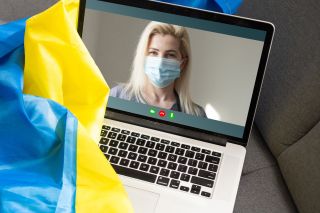Trauma
Human Traffickers Target Ukrainian Refugees
An American therapist is delivering emergency help for trafficking survivors.
Updated July 6, 2023 Reviewed by Hara Estroff Marano
Key points
- Eight million Ukrainians have been displaced because of the war.
- Human traffickers prey on the millions of displaced individuals who can’t find work or shelter.
- An American therapist is supplying emergency first aid for trafficking victims.

The ongoing conflict between Ukrainian soldiers and Russian forces has captured media attention. However, Ukraine is silently grappling with another formidable adversary: human trafficking. The large numbers of refugees resulting from the Russian invasion has created fertile ground for this abhorrent trade to flourish.
With approximately eight million Ukrainians enduring displacement, many find themselves in unfamiliar territories, unable to communicate and lacking the means to secure basic necessities such as food and shelter. By exploiting these circumstances of vulnerability, human traffickers have found displaced individuals easy prey.
Julie Probus-Schad, a licensed clinical social worker and the Director of Trauma Assistance Program International, has witnessed firsthand how Ukraine has become a hub for human trafficking. Organized crime syndicates have seized the opportunity presented by the ongoing conflict, and their return on investment for trafficking is alarmingly favorable.
Human Beings as Commodities
While the term "return on investment" may seem callous when applied to human lives, Probus-Schad explains that while most of us value individuals as unique and irreplaceable, criminal networks perceive them as commodities to be bought and sold. Given the large influx of refugees during the war and the ease with which trafficked individuals can be transported to other countries, Ukrainian women have become prime targets for sex trafficking. Tragically, they yield an enticing return on investment for the criminals involved.
Magnitude of the Issue
While it is impossible to know the exact number of Ukrainians who have fallen victim to human trafficking, experts from the Organization for Security and Co-Operation in Europe say that the estimate of 5,000,000 trafficked individuals is a number that can be seriously considered. Regardless of the precise figure, the suffering and trauma inflicted upon the victims is large-scale.
Addressing the Hidden Consequences
People of good will throughout the world need to confront and assist Ukraine in combating this lesser-recognized consequence of the war. Julie Probus-Schad's extensive experience as a licensed clinical social worker specializing in human trafficking equips her with the expertise to tackle the issue. Via remote sessions conducted over platforms like Zoom, she imparts her knowledge to social workers in Latvia and Ukraine’s other nearby countries, teaching them a first-aid approach to assisting survivors of trafficking.
Probus-Schad's intervention primarily focuses on assisting individuals in coping with acute distress disorder and PTSD, which often persists even after victims escape their trafficking ordeal. She explains that traumatic experiences can trigger a prolonged activation of stress hormones, including adrenaline and cortisol, which continue to flood the survivor's system long after the trauma has ended.
Coping Mechanisms
Trauma can cause individuals to be frozen in a defensive fight, flight, or freeze response or a response of submission. In such a frozen state, victims find it challenging to access higher-order coping skills that could aid their recovery. The traumatized person's defensive alarm system remains hyperactivated, resulting in chronic exhaustion and debilitating symptoms, which can include anxiety, depression, dissociation, emotional numbness, fear, and helplessness, and can prompt substance abuse.
Calming Therapy
Probus-Schad employs bilateral rhythmic tapping therapy as a first-aid type of intervention. Its primary goal is to help create calmness, enabling survivors to access their higher-order coping mechanisms.
During the therapy, the survivor is asked to imitate Probus-Schad's tapping gestures to create a soothing effect. When working with a new client suffering from acute post-traumatic stress, Probus-Schad follows and teaches the following steps:
- Building rapport: In a war zone, this needs to happen more quickly than usual because, given the ongoing number of people needing help, a therapist or other health care professional is likely to have a shorter time with the trafficking survivor.
- Learning about the client’s current state: Individuals are asked to give an outline of the traumatic experience. Instead of reliving the traumatizing events, the therapist asks the survivor to provide a brief outline of what they have been through, allowing them to avoid retraumatization.
- Explaining tapping and setting expectations: The therapist explains what the survivor can anticipate from the tapping process. The tapping rhythm effectively diminishes excessive anxiety, helping the survivor reconnect with their pre-trauma world and discharge moments of terror from their overall life experience.
- Redirecting thoughts to moments of calm: While in a relaxed state during the tapping, the survivor is encouraged to recall moments of peace and tranquility. As they tap their fingers, the survivor is guided to redirect their thoughts to those peaceful instances.
- Drawing strength from internal and external sources: Throughout the therapy session, Probus-Schad prompts survivors to tap into additional sources of strength, such as envisioning wise, nurturing, or protective figures.
By the end of one or several sessions, survivors of trafficking generally experience increased relaxation and are no longer operating solely in survival mode. With improved access to their pre-existing coping skills, they are better equipped to navigate the challenges of recovery.
Extending Psychological Support
Probus-Schad is acutely aware of the dire need for psychological support in Ukraine. She actively seeks professionals interested in contributing their skills and aims to connect them with programs that match their needed expertise.
While the media predominantly covers the battles between Ukrainian soldiers and Russian forces, the alarming issue of human trafficking has emerged as another consequential battle in Ukraine. With millions of displaced Ukrainians falling prey to human traffickers, urgent attention and concerted efforts are required to address this hidden crisis. By working cooperatively, the global community can provide the necessary support to trafficking survivors.
References
Parnell Institut, https://parnellemdr.com/our-approach/
Julie Probus-Schad Home Page, https://www.julieprobusschad.com




